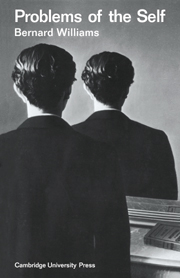Book contents
- Frontmatter
- Contents
- Dedication
- Preface
- 1 Personal identity and individuation
- 2 Bodily continuity and personal identity
- 3 Imagination and the self
- 4 The self and the future
- 5 Are persons bodies?
- 6 The Makropulos case: reflections on the tedium of immortality
- 7 Strawson on individuals
- 8 Knowledge and meaning in the philosophy of mind
- 9 Deciding to believe
- 10 Imperative inference
- 11 Ethical consistency
- 12 Consistency and realism
- 13 Morality and the emotions
- 14 The idea of equality
- 15 Egoism and altruism
- Bibliography
- Index of names
14 - The idea of equality
Published online by Cambridge University Press: 07 December 2009
- Frontmatter
- Contents
- Dedication
- Preface
- 1 Personal identity and individuation
- 2 Bodily continuity and personal identity
- 3 Imagination and the self
- 4 The self and the future
- 5 Are persons bodies?
- 6 The Makropulos case: reflections on the tedium of immortality
- 7 Strawson on individuals
- 8 Knowledge and meaning in the philosophy of mind
- 9 Deciding to believe
- 10 Imperative inference
- 11 Ethical consistency
- 12 Consistency and realism
- 13 Morality and the emotions
- 14 The idea of equality
- 15 Egoism and altruism
- Bibliography
- Index of names
Summary
The idea of equality is used in political discussion both in statements of fact, or what purport to be statements of fact – that men are equal – and in statements of political principles or aims – that men should be equal, as at present they are not. The two can be, and often are, combined: the aim is then described as that of securing a state of affairs in which men are treated as the equal beings which they in fact already are, but are not already treated as being. In both these uses, the idea of equality notoriously encounters the same difficulty: that on one kind of interpretation the statements in which it figures are much too strong, and on another kind much too weak, and it is hard to find a satisfactory interpretation that lies between the two.
To take first the supposed statement of fact: it has only too often been pointed out that to say that all men are equal in all those characteristics in respect of which it makes sense to say that men are equal or unequal, is a patent falsehood; and even if some more restricted selection is made of these characteristics, the statement does not look much better. Faced with this obvious objection, the defender of the claim that all men are equal is likely to offer a weaker interpretation.
- Type
- Chapter
- Information
- Problems of the SelfPhilosophical Papers 1956–1972, pp. 230 - 249Publisher: Cambridge University PressPrint publication year: 1973
- 62
- Cited by



